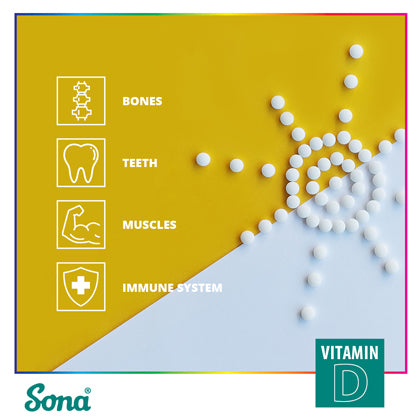
Vitamin D is a type of fat-soluble vitamin. Fat-soluble vitamins refer to the vitamins that are absorbed along with fats in the diet and can be stored in the body's fatty tissue.
Vitamin D plays a key role in numerous important bodily processes. This includes helping the body absorb other nutrients, ensuring that your muscles and bones work efficiently, regulating neurotransmitter synthesis, helping to support the immune system, supporting heart health, as well as regulating insulin levels.
Research suggests that almost half the Irish population is deficient in vitamin D. This is believed to be due to the country’s lack of consistent sunlight, especially UVB rays, in addition to longer working hours indoors. However, some individuals are even more susceptible than others. This includes those who:
- Are following a vegan or vegetarian diet
- Eat an inadequate amount of fortified foods
- Have a dark skin tone (greater amounts of the pigment melanin in the skin lessen the ability of the skin to absorb UV rays for vitamin D production)
- Have cystic fibrosis, Chron’s disease, and celiac disease (these diseases do not allow the intestines to absorb enough vitamin D through supplements)
- Have a kidney or liver disease (these diseases reduce the number of enzymes required to covert vitamin D to the form that can be utilised by the body, thus leading to inadequate levels of active vitamin D within the body)
- Are elderly (as you age, your skin does not synthesis as much vitamin D as when you are younger)
- Smoke
- Are obese (those of a larger body size require more vitamin D for optimum function, in addition, since vitamin D is stored in fat it is harder to keep it in blood circulation)
- Have received a form of weight loss surgery (weight loss surgeries that reduce the size of the stomach and/or bypasses part of the small intestines make it very difficult to consume enough nutrients, vitamins, and minerals)
- Spend more time indoors than out (those who are housebound/confined)
- Work night shifts
- Live in areas that reduce direct sunlight (cities with tall buildings)
- Live in areas with high pollution that can filter out UV rays
Sona D1000 provides 1000IU of Vitamin D per tablet, the recommended amount which helps to support your immune system.
References
- EHRLICH, G. (2010). Sunshine and Vitamin D. A Comprehensive Guide to the Benefits of the “Sunshine Vitamin”. The Journal Of Rheumatology, 37(2), 475-475. doi: 10.3899/jrheum.091173.
- Kim, S., Lutsey, P., & Michos, E. (2017). Vitamin D and Cardiovascular Disease: Can Novel Measures of Vitamin D Status Improve Risk Prediction and Address the Vitamin D Racial Paradox?. Current Cardiovascular Risk Reports, 11(1). doi: 10.1007/s12170-017-0528-7.
- Martens, P., Gysemans, C., Verstuyf, A., & Mathieu, C. (2020). Vitamin D’s Effect on Immune Function. Nutrients, 12(5), 1248. doi: 10.3390/nu12051248.
- Penckofer, S., Kouba, J., Byrn, M., & Estwing Ferrans, C. (2010). Vitamin D and Depression: Where is all the Sunshine?. Issues In Mental Health Nursing, 31(6), 385-393. doi: 10.3109/01612840903437657.
- Relationship between serum Vitamin D and insulin resistance in pre-diabetic and diabetic states- A comparative study. (2020). International Journal Of Clinical Biochemistry And Research, 5(1), 91-96. doi: 10.18231/2394-6377.2018.0018.
- Tanner, S., & Harwell, S. (2015). More than healthy bones: a review of vitamin D in muscle health. Therapeutic Advances In Musculoskeletal Disease, 7(4), 152-159. doi: 10.1177/1759720x15588521.
- Vitamins and minerals - Vitamin D. (2021). Retrieved 14 July 2021, from https://www.nhs.uk/conditions/vitamins-and-minerals/vitamin-d/.
- Vitamin D Deficiency: Symptoms & Treatment. (2021). Retrieved 21 July 2021, from https://my.clevelandclinic.org/health/articles/15050-vitamin-d--vitamin-d-deficiency.
